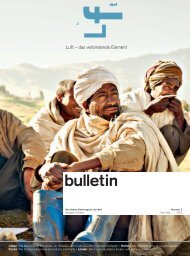Europe
From Crisis to opportunity Global Investor, 01/2014 Credit Suisse
From Crisis to opportunity
Global Investor, 01/2014
Credit Suisse
You also want an ePaper? Increase the reach of your titles
YUMPU automatically turns print PDFs into web optimized ePapers that Google loves.
GLOBAL INVESTOR 1.14 — 05<br />
THE CRISIS<br />
<br />
<br />
4<br />
SPAIN<br />
GERMANY<br />
EUROZONE<br />
FRANCE<br />
ITALY<br />
GREECE<br />
2007<br />
2011<br />
2014<br />
<br />
2<br />
0<br />
Debt less than<br />
60% of GDP<br />
and budget<br />
below<br />
% of GDP<br />
The crisis in the Eurozone is often regarded as<br />
primarily resulting from imbalances in the member<br />
<br />
is only part of the story. In fact, most governments,<br />
with the exception of Greece, were running<br />
<br />
government, in particular, generated a surplus in<br />
2007 <br />
of EMU countries was no worse than that of other<br />
advanced economies, such as the UK, not to men-<br />
<br />
in the wake of the crisis itself. The true story of the<br />
EMU<br />
<br />
–2<br />
–4<br />
–6<br />
–8<br />
–10<br />
–12<br />
Source: EU Commission, Datastream, Credit Suisse<br />
0 40 80 120 160 200<br />
<br />
… but rather a balance of payments crisis<br />
Current account balances of selected Eurozone members<br />
<br />
300<br />
200<br />
100<br />
0<br />
–100<br />
–200<br />
–300<br />
Germany France Spain Greece Eurozone<br />
Source: Datastream, Credit Suisse<br />
1997 1999 2001 2003 2005 2007 2009 2011 2013<br />
With devaluation and currency risk apparently<br />
removed due to the creation of the single<br />
<br />
accelerated sharply from the mid-2000s on<br />
Accelerating import growth<br />
needed to be funded internationally. Given<br />
higher yields on government bonds and other<br />
investments, attracting the funds was quite<br />
easy. Low global interest rates, promulgated<br />
by the Federal Reserve’s easy monetary<br />
stance, added to the attractiveness of this<br />
trade, while savings surpluses in Germany<br />
and emerging markets were seeking an<br />
outlet and better returns.<br />
<br />
its peak in 2008. As the global recession hit<br />
and the general deleveraging process set in,<br />
<br />
contraction only started about a year after the<br />
Greek blowup. Private funds dried up as fears<br />
<br />
via the central banks’ Target2 system made<br />
up for some of the remaining shortfall. In<br />
addition, demand for external capital dropped<br />
sharply in response to the crisis and recession<br />
itself.<br />
In the meantime, the periphery has<br />
started to generate surpluses, i.e. it has begun<br />
to export capital. This is, in part, due<br />
to the improved competitiveness and trade<br />
surpluses, but also results from ongoing<br />
private sector deleveraging in the periphery.<br />
Unless domestic demand picks up much<br />
more decisively, the Eurozone as a whole will<br />
continue to generate surpluses and export<br />
capital to the rest of the world, and contribute<br />
to what former Fed Chairman Ben Bernanke<br />
has called the global “savings glut.”<br />
Real estate bubbles,<br />
busts and stabilization<br />
Economic boom, falling interest rates, easy lending<br />
<br />
<br />
<br />
estate bubbles within the Eurozone. Not all countries were<br />
affected similarly. Neither the German nor the French<br />
<br />
Spain, Ireland or the Netherlands. Tougher regulators<br />
<br />
<br />
<br />
<br />
<br />
<br />
<br />
gage rates decline. The latest data also show a slight<br />
<br />
<br />
100<br />
90<br />
80<br />
70<br />
60<br />
50<br />
40<br />
<br />
<br />
30<br />
Source: Bloomberg, Datastream, Credit Suisse<br />
–10 –8 –6 –4 –2 0 2 4 6 8

















